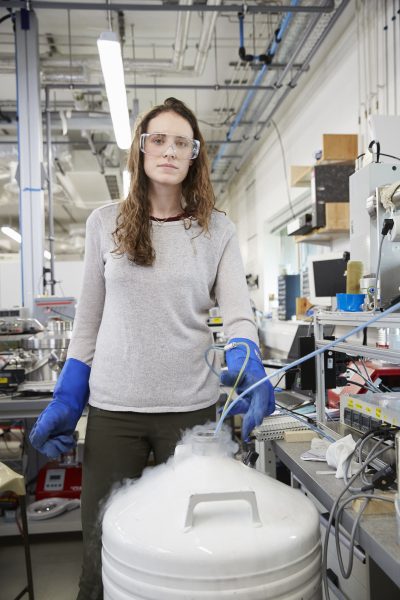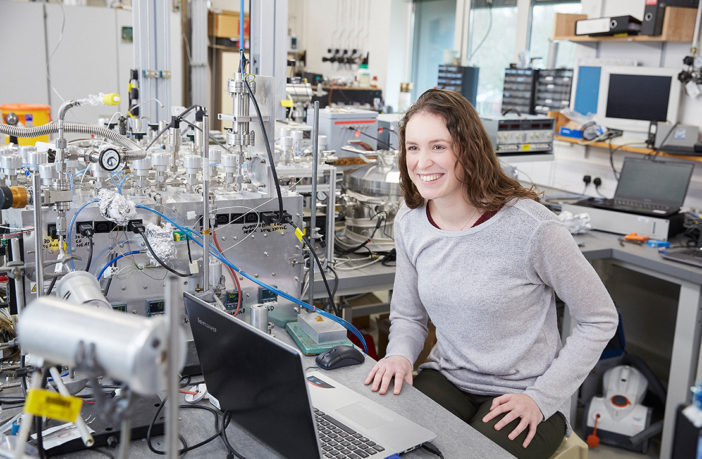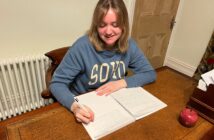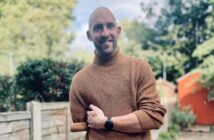Hannah Sargeant is a PhD student at The Open University, working on techniques to extract water from Moon rocks. As around the globe, people remember the 50th anniversary of the Moon landings, we talked to her about what led her to the OU and her work as a researcher:
“Why did I choose to work in Space research? I love doing something different and exciting.
“When I was 12 I went to the Kennedy Space Centre in Florida, and I came back saying I wanted to work at Ground Control and wanted to work with NASA. I remember standing underneath the Saturn V rocket, which is the biggest rocket ever built, and being blown away by the scale of it. I thought it was so cool- and still do!
I found my niche
“I always wanted to be a scientist, but wasn’t sure which discipline to follow. An incredible teacher at school inspired me to go on to do Physics at university. I graduated with a 2:2, which at the time wasn’t enough to allow me to go in to academia. My passion for science and love of working with children led me to a PGCE, and I became a maths and physics teacher.
“By now, I had enough on my CV to look at studying for a masters, and was accepted onto a Space Exploration Systems programme. I found my niche – I found what I was good at. I achieved the highest grade with a distinction.
“I was looking at what to do next and happened to find the PhD at the OU working on a mission to find resources on the Moon. It was a real-life application of the research projects I’d been doing so far.
“When I applied to the OU I hadn’t had my Masters results through, so I had no evidence of my ability. They still saw my potential and accepted me. I really appreciate them taking that chance on me.”
Cutting edge research
“I didn’t know that The Open University did PhDs; it wasn’t even in my periphery, I didn’t know anything about it! People often think the OU is only a virtual entity, they don’t always realise that we perform cutting edge research at a real campus in Milton Keynes. Somehow I stumbled upon the list of PhDs on offer and they were nothing like anything else I’d seen. This was the only PhD I applied for as the PhDs at other institutions were too theoretical for me.
“There’s so much expertise here across multiple disciplines, and so much of a focus on Space, rather than just one aspect of it. We’re applying our expertise to different planetary bodies to better understand them. We cover astrobiology, engineering, space and planetary geology, physics…. We can combine all the different skills into something really practical. I’m able to work on real space missions, today.”
“For my PhD, the team are building an instrument which will go to the south pole of the Moon to try and find water. If we can’t find water, we’re going to try and make it. My job is to take that machine and see if we find a way to use it to try and make water on the Moon for the first time.”
Science isn’t just about lab coats

“On a day to day basis my work is really varied, which is great because I don’t get bored. As soon as I finish one task, there’s a million and one other different types of tasks to be done.
“I can be building or fixing a machine, running experiments with the machine, processing data on the computer, writing my thesis, preparing conference materials, preparing samples, running the samples on the imaging machine. I can be up and down from my seat all day.
“I don’t wear a lab coat all the time- I’m in here with spanners and screwdrivers, we’re building and changing things. It’s not a sterile lab with defined experiments, there’s a lot of trial and error in my work. I like that it’s a working lab.”
Proud to be a part of the space science programme
“The reputation of the OU within the planetary and space science community is world class. The team I’m working with built an instrument that was on the Rosetta mission, they built one to go to a comet, and one that went to Mars on Beagle 2. Knowing that my work could be flown to the Moon in a few years’ time is the best motivator.
“In a generally male dominated field, particularly compared to 50 years ago during the first crewed landing on the Moon where women were few and far between, I am proud to be a part of the space science programme today.”
The main image of Hannah was taken as part of a new photography collection by renowned British photographer Chris Floyd, to mark the OU’s 50th Anniversary.
See the rest of the inspirational students and alumni featured in the collection at 50.open.ac.uk/photography



